Search the Special Collections and Archives Portal
Search Results

Transcript of interview with Howard E. Hollingsworth by Joseph Concannen, February 23, 1979
Date
Archival Collection
Description
On February 23, 1979, collector Joseph Concannen interviewed educator, Howard E. Hollingsworth (born October 3rd, 1927 in Preston, Idaho) in J. D. Smith Junior High School in Las Vegas, Nevada. This interview covers the history of Nevada. Mr. Hollingsworth also discusses the Mormon Fort, ranches, and the railroad.
Text

Midway Ore Station at Tonopah and Tidewater: photograph
Date
Archival Collection
Description
Image
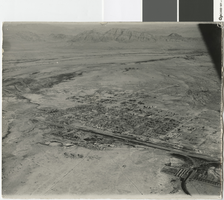
Aerial photograph of Union Pacific Railroad yards, Las Vegas, late 1920s
Date
Archival Collection
Description
Aerial view of Las Vegas and Union Pacific Railroad yards.
Transcribed Notes: Transcribed from back of photo: "[Identified by Dave Coons as LV Valley w/UPRR yards in Foreground. Late 1920s?] [Kim Geary - Roberts IDs ca 1931. EP 6-21-84]."
Image
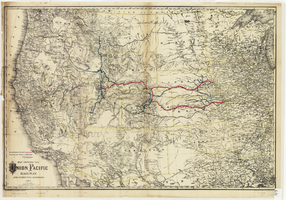
Map showing the Union Pacific Railway and connecting railroads, 1888
Date
Description
Image
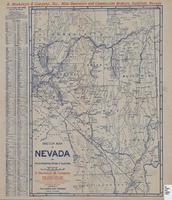
Sketch map of Nevada and the southeastern portion of California, 1906
Date
Description
Image
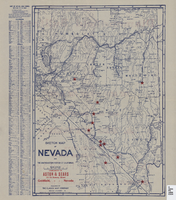
Sketch map of Nevada and the southeastern portion of California, 1906
Date
Description
Image
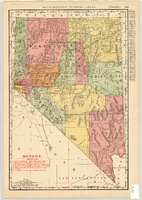
Map showing railroads in Nevada, 1904
Date
Description
Text
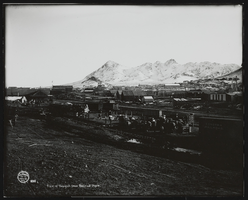
View of Tonopah from Railroad Depot: photograph
Date
Archival Collection
Description
Image
Sarann Knight Preddy, Elizabeth Warren, and Woodrow Wilson oral history interview
Identifier
Abstract
Oral history interview with Sarann Knight Preddy, Elizabeth Warren, and Woodrow Wilson conducted by Porter Troutman on July 19, 1977 for the Ralph Roske Oral History Project on Early Las Vegas. In this forum, Knight, Warren, and Wilson discuss the history of West Las Vegas, Nevada. Knight recalls arriving to Las Vegas in 1942 and describes the African American experience at that time. She talks about being the first woman of color to receive a gaming license, dealing cards, and the city ordinance which banned African American dealers. Wilson remembers the living conditions before federal housing and race restrictive covenants in housing. Then, Warren talks about the city's early years, the history of discrimination against African Americans in the city, and the significance of the railroad in Las Vegas. The group answers questions asked by audience members throughout the duration of the forum.
Archival Collection

Newspaper clipping, Where I stand, Las Vegas Sun, May 9, 1953
Date
Archival Collection
Description
Editorial from the Las Vegas Sun. Unlike a noble French merchant, who sacrificed greatly to give the people of Marseilles good water, the water company is trying to bleed all the money they can out of the situation before surrendering it to the water district. "80-11" written in red pencil. Date stamp from E.C.R.
Text
